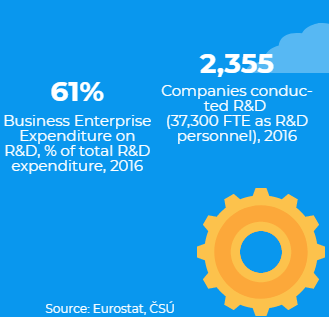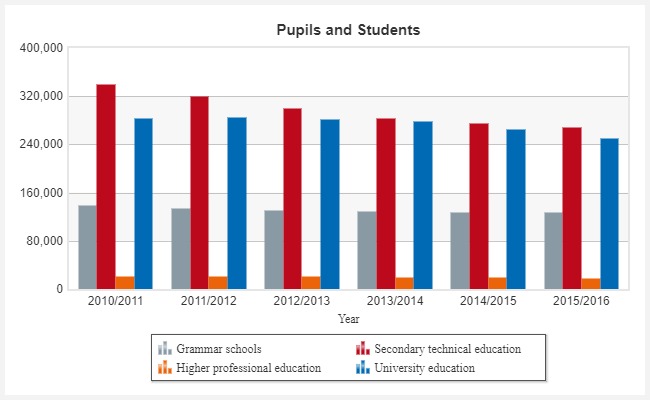
According to Eurostat, the Czech Republic has 11th highest number of R&D personnel and 17th highest R&D expenditure per capita in the EU and they have been dropping. The Government has taken measures to reverse the trend.
More than 38.4% of workforce is highly skilled, according to Manpower Group Totoal Workforce Index 2017. But the number of university students and those in vocational education has decreased.

Source: Czech Statistical Office
A recently published report by the National Institute for Education (NUV) shows that, overall, the level of application of qualification acquired by vocational education has not changed much over the 10-year period covered by the analysis. More pronounced, positive changes in terms of professional stability can be observed in the field of engineering.
'64% of all those trained in engineering have a job fully corresponding with their qualification. In the group of graduates aged up to 29, this share rises even to 70%. These are, for example, automotive mechanics and engineering equipment mechanics, locksmiths, tools or metalworkers,' says Helena Úlovcová, Deputy Director of NÚV department for the management of the section for analysis, qualification and vocational training. 'Graduates in the field of engineering have been the "most faithful" and stick the most to their qaulifications - not only at the time of leaving their school, but also during their professional life,' Helena Úlovcová explains. More.
.@Hays_CZ salary survey 2018: "The market is now much more open towards applicants without experience and students can therefore gain an interesting and valid working experience...There has been continuously critical situation in technical study fields...." https://t.co/lqyiZXChAs
— AmCham CZ (@AmChamCZ) January 18, 2018
Ladislav Kučera, Managing Director Hays Czech Republic: 'The year of 2016 was characterised by an extremely high demand for graduates and junior candidates for newly created jobs. In the past year, this demand had been extended in a quite significant way by managerial roles, both for permanent and temporary employment, after a longer period of time.
However, the current situation in the labour market represents considerable constraints on companies. A lot of positions remain open over a long period of time because companies are unable to find qualified professionals. There are more vacancies in the market than high-quality candidates. The critical situation persists in technical fields where we are aware of the long-term low interest of students in this field; however, there is a shortage of experienced professionals as well.'
Source: 2018 Hays Salary Guide EN
Some more statistical data about R&D, STEM & skills in the Czech Republic are available in the infrographic below:

On 13 February 2018, GE Aviation and Czech Technical University in Prague (ČVUT) have officially announced that they will cooperate on research to develop advanced turboprop engines and aviation manufacturing technologies, including 3D printing. When the agreement is complete, ČVUT will have four ground cells for testing an advanced turboprop engine and one airplane that will serve as a flying test cell. The first ground cell is up and running. GE will also contribute know-how. ČVUT will receive a grant of CZK 950 million from the Czech government.
ČVUT is not the only university in the country that has been cooperating with industry, ihned.cz news portal adds. Brno University of Technology (VUT) has agreements with dozens of companies, too. 'Among stable partners are, for example, ArcelorMittal USA or South Korea's POSCO, the world's third-largest steel producer,' said Radana Kolčavová, a spokesperson for VUT. VUT’s most important achievement is a biotechnology that produces degradable plastic from used frying oil. This plastic can be used for the production of foils in agriculture, for example. The Nafigate company purchased a license from the university and has launched its first production line in China.
Czech Airlines Technics and the Faculty of Transportation of the Czech Technical University in Prague signed a two-year memorandum of cooperation in the area of aviation. As part of the newly-agreed cooperation, students will be offered the possibility of longer-term internships and thesis-writing directly in the CSAT service. The university will gain access to discarded or damaged parts from aircrafts. The cooperation will also include evaluation of operational reliability and safety by the University, according to planes.cz.